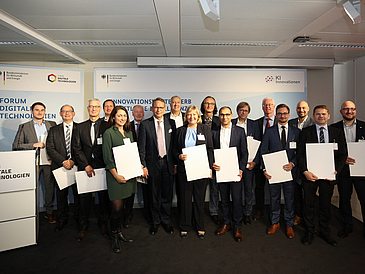With this favorable declaration, the next obstacle in the selection process of the “Artificial intelligence as a driving force in economically relevant ecosystems” (Künstliche Intelligenz als Treiber für volkswirtschaftlich relevante Ökosysteme) competition has been cleared. Subject to the parliamentary decision on the federal budget, around 10 million euros will be injected into the north. The universities of Lübeck, Kiel, Hamburg, and Bremen, and the German Research Centre for Artificial Intelligence (DFKI) are involved in the project. The “AI-Space for Intelligent Health systems” (KI-SIGS) project is supported by the state governments in Schleswig-Holstein, Hamburg, and Bremen. The KI-SIGS concept aims to stay abreast of the changes that are occurring due to digitalization: the structural changes in the economy, the job market, and society. The ever-increasing digitalization in the health economy, medicine, and medicine technology is causing a quick upswing in the number of large, heterogeneous, complex, and in some cases unstructured data sets in all areas of life sciences. This data holds great potential for intelligent health systems and adaptive, self-learning AI technologies.
Professor Christoph Lüth from the Cyber-Physical Systems research field at the German Research Centre for Artificial Intelligence/University of Bremen adds: “KI-SIGS will push the application of AI techniques in the field of medicine forward. The companies in Northern Germany will profit from this and it will increase their competitive position. The universities and research institutes, such as the DFKI, will also profit, as they will be able to begin new and interesting projects with companies. In this way, KI-SIGS can become an innovation motor in North Germany and beyond. We are really looking forward to KI-SIGS!
Artificial Intelligence in Clinics
Professor Claudia Schmidtke, a member of the German parliament (Bundestag) and the heath committee, who is also the patient representative within the German government, explains the nationwide significance of the project: “With a healthy dose of confidence we can now say that the north is one of the top locations for artificial intelligence in the health sector. Outstanding universities and university clinics, a close connection to practical work in company clusters, and also the immense support of national and state politics have made this possible. We want to continue this story of success together: We are developing the frameworks and customized funding programs for this in Berlin. In Lübeck we continue to solidify our extraordinary competencies in the fields of health, nutrition, and computer science.”
Bremen’s senator for economy, labor, and Europe, Kristina Vogt, emphasizes: “We are extremely happy that the joint efforts of the North German states led to us winning this project. AI and health are an expedient and future-oriented combination. Recognized cutting-edge research is already being carried out in Bremen together with the DFKI and Fraunhofer MEVIS.
Her colleague, the senator for science and ports, Dr. Claudia Schilling, adds, “With our newly acquired partners, our joint research landscape offers a strong foundation for the further development of our role in the field of AI-based health economy.”
Further Information:
https://ki-sigs.de/ (in German only)
Contact:
Prof.Dr. Christoph Lüth
German Research Centre for Artificial Intelligence (DFKI)
University of Bremen
Phone: +49 421 218 59830
Email: Christoph.Luethprotect me ?!dfkiprotect me ?!.de
German Research Centre for Artificial Intelligence (DFKI)
Corporate Communications Bremen
Phone: +49 421 178 45 4180
Email: uk-hbprotect me ?!dfkiprotect me ?!.de

